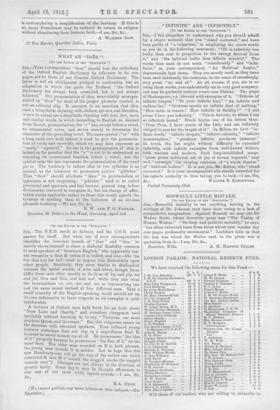" INFINITE " AND " IN FINITELY."
[TO THE EDITOR OF TIES "SPECTATOR:I
fail altogether to understand why you should admits for a single moment that you " stand corrected," and have been guilty of " a vulgarism," in employing the above words as you do in the following sentences : " Oil is infinitely less- bulky than coal in proportion to the energy derived from it," and "the habitual loafer does infinite mischief." The words thus used do not mean " considerably " and "inde- finite," as your correspondent, "An Habitual Loafer," dogmatically lays down. They are merely used, as they have been used habitually for centuries, in the sense of exceedingly; very great, "no end of." At all events, if you sin in so using these words, you undoubtedly sin in very good company, and may be perfectly content errare ettnt Platone. The plays of Shakespeare, e.g., abound with examples of it. "Fellows of infinite tongue," " To your infinite loss," " An infinite and endless liar," " Gratiano speaks an infinite deal of nothing," "How noble in reason! How infinite in faculty!" "I will swear I love you infinitely." "This is Antonio, to whom I am, so infinitely bound." Steele begins one of his letters thus: "Dear Prue, I have yours of the 14th, and am infinitely obliged to you for the length of it." In Milton we have in- finite deeds," "infinite despair," " infinite calamity," " infinite manslaughter," "goodness infinite, goodness immense." In truth, the list might without difficulty be extended infinitely, with infinite examples from well-known writers, both ancient and modern. Such long-established usage, "quem penes arbitrium est, et jus et norms loquendi," may well "outweigh " the carping criticism of "a whole theatre" of " habitual loafers." It Ls not you, Mr. Editor, who !'istandi corrected," It is your correspondent who stands corrected for' his infinite. audacity in thus taking you to task.—I am, Sir,.






































 Previous page
Previous page